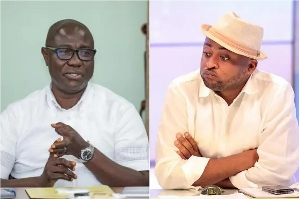By
Emmanuel Sarpong Owusu-Ansah (Black Power)
Thank you all for the many interesting comments on my article, ‘Raymond Atuguba Is Both Right And Wrong’, confidently and intelligently expressing your opinions on the Atuguba saga. Your great contributions have encouraged me to come up with another article on the subject. I believe this piece will somehow clarify some important points and answer certain seemingly enigmatic questions.
Man, according to the ancient philosopher, Protagoras, ‘is the measure of truth’ (which of course might or might not be the objective truth); in other words, we all are entitled to our own opinions (even if they are far from the objective or the real truth). Being entitled to one’s opinion also means bearing any consequences generated by the opinion held. That some Ghanaian judges take bribes is an undeniable fact (a claim that I, as an investigative journalist can convincingly substantiate or prove); and it is the duty of every Ghanaian citizen including Dr Atuguba to expose any form of corruption in the country.
Dr Atuguba’s statements as established in my previous article is not necessarily a universal proposition (refer to my previous article). However, it takes a person with a strong philosophical or logical brain to realize the particularity or the “particularness” (not yet an English word) of his statement; and since his audience on that occasion was the entire people of Ghana many if not most of whom do not have a philosophical background, one would have expected him to stick to a very transparent (easily deciphered or decoded) vocabulary by categorically qualifying his statements with words or phrases such as: some, certain, many, a lot of, etc. judges. This for me was his “crime”. As expected, many Ghanaians including some of his own colleagues and the judges unfortunately considered his statements as ‘universal’ (general) rather than ‘particular’ propositions; a situation capable of creating unnecessary controversy, panic and diametric loss of trust in the Judicial System as my good friend Fr. Lawrence Gyamfi rightly contends. In such circumstances, the temptation or tendency for people to reintroduce the AN EYE FOR AN EYE, A TOOTH FOR A TOOTH system becomes undeniable. This in turn results in what Thomas Hobbes calls bellum omnium contra omnes – the war of all against all (hence, persistent hideous crimes, constant violence and threat, chaos, and insecurity, become inevitable); consequently, humanity’s life becomes ‘solitary, poor, nasty, brutish and short.’ (Hobbes’ Leviathan).
If he was really making ‘particular propositions’ as I personally believe, does one blame the public and the judges for misconstruing his statements? Probably not, since he himself paved the way for some people to misunderstand where he was coming from. Remember, his comment has generated massive hullabaloo because of who he is – the significant position he occupies within the judiciary and in fact the entire Ghanaian society. Parallel controversy and heated debate could be witnessed in Ghana if the IGP or any top Police Officer makes similar ambiguous (i.e. seemingly generalized) corruption allegation against the Ghana Police Force.
Were the judge(s) right in boycotting or refusing to hear the case involving the man who had Dr Atuguba as his counsel lawyer?
Humans will always remain humans with all the feelings or human emotions intact. Hence, being the most educated, tolerable, impartial, principled, and/or the most religious (or the holiest) person on earth, does not and can never guarantee immunity from experiencing emotional pain or anger. Until calmed and composed, emotionally hurt persons can understandably do unfair or unwarranted things as a form of revenge against their supposed offenders; and magistrates or judges whose feelings are “tempered with” are no exception. Unofficial case in point:
Barely a week before the FIFA Executive Committee’s meeting to select the countries to host the 2018 and 2022 World Cup Finals, the BBC broadcasted (or broadcast) what was in my opinion a far from convincing documentary accusing many of the members of the executive committee of bribery and corruption. England sadly lost the bid to host the 2018 tournament despite the fact that their presentation was probably the best and most impressive. The shock of the English people was aggravated when it came to light that England crashed out of the contest in the first round with only two votes (one of which was from the only British person on the committee). Now a section of the English media alleges that the countries that won the bids paid bribes, ignoring the dodgy allegations their giant media corporations, the BBC and the Sunday Times levelled against some key members of the FIFA executive committee whose hands their fate lay, days before the event.
Based on this observation, I maintain that if the judges were in some emotional pain and thought they might as humans inadvertently pass unfair judgement, then they probably did the honourable thing by not hearing the case on that particular day or probably adjourning it? On the other hand, if they refused to hear the case in protest or as a form of revenge for the bribery and corruption allegation by the plaintiff’s lawyer (Atuguba) against some members of the judiciary, then both the plaintiff, his lawyer, and in fact concerned Ghanaians have a score to settle with the judge(s) who refused to hear the case on the proposed date. This said, I insist that every Ghanaian has the right to employ or appoint a lawyer that they trust to represent them in court; forcing them to change lawyers for intangible reasons, means trampling on their rights. Judges will be committing a serious offence and dragging the Ghanaian judicial system into the mud if they deny a person justice simply because they harbour a grudge against his/her lawyer and not based on the facts and evidence provided in court or before them.
Emmanuel Sarpong Owusu-Ansah (aka Black Power) is a Lecturer and an Investigative Journalist in London
Opinions of Monday, 23 May 2011
Columnist: Owusu-Ansah, Emmanuel Sarpong














